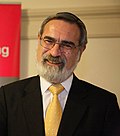Duluth, Minnesota (OpEdNews) September 22, 2016: Out of the enormous tragedy of the Holocaust, God has raised up out of his chosen people in the United Kingdom the prolific Rabbi Lord Jonathan Sacks (born in 1948; married in 1970), the recipient of the 2016 Templeton Prize, who did his undergraduate studies in philosophy at Cambridge University and his doctoral studies in philosophy at Oxford University in 1981-- in political philosophy -- and his rabbinical studies at the Jews' College and Yeshivat Etz Chaim in London.
Rabbi Sacks' new book is titled Essays on Ethics: A Weekly Reading of the Jewish Bible (2016). It includes a foreword by former Senator Joseph I. Lieberman.
If you like truth in advertising, then I should tell you that the main title and the subtitle accurately advertise the truth of this book. It consists of readings/commentaries on selections from the Hebrew Bible, with special attention to discussing ethics -- and social and political history and philosophy. At times, Rabbi Sacks' comments involve close etymological and grammatical analysis of certain Hebrew words, which I always find informative and instructive.
As I say, Rabbi Sacks always begins with a selected passage from the Hebrew Bible. He explicates its wording and usually tells us how it has been interpreted in different ways over the centuries by various Jewish interpreters. But then he adds his creative interpretation. His creative interpretation is always fun to read. You will probably not be bored by his creative interpretations.
But stand forewarned. Rabbi Sacks often refers to Rambam and to Ramban.
Rambam is Rabbi Moses ben Maimon, or Maimonides, 1135-1204 (page 4).
Ramban is Rabbi Moses ben Nahman, or Nahmanides, 1194-1270 (page 15).
Rabbi Sacks' accessible new book Essays on Ethics is probably not in danger of becoming a best-seller in the United States.
My, oh my, Rabbi Sacks is not going to be popular with the political-correctness crowd.
In Rabbi Sacks' estimate, the bonds of collective loyalty were "weakened by the individualism of the 1960s and further damaged by the ill-thought-out multiculturalism of the 1980s" (page xxxiv). We might wonder what a well-thought-out multiculturalism would be.
Rabbi Sacks also says, "Community is the antidote to individualism on the one hand and overreliance on the state on the other" (page 143). He credits Alexis de Tocqueville with coining the term "individualism" (page 296). (Individualism in the pejorative sense should not be confused with individuation and individuality.)
Rabbi Sacks also says, "In Judaism, it is as a community that we come before God. For us the key relationship is not I-Thou, but We-Thou" (page 143).
But Rabbi Sacks says that "the love of God is particular. It is an I-Thou personal relationship" (page 22).
Later in his book, Rabbi Sacks says, "One of the aftermaths of Marxism, persisting in such movements as postmodernism and postcolonialism, is the idea that there is no such thing as truth. There is only power. The prevailing 'discourse' in a society represents not the way things are, but the way the ruling power (the hegemon) wants things to be. All reality is 'socially constructed' to advance the interests of one group or another. The result is a 'hermeneutic of suspicion,' in which we no longer listen to what anyone says; we merely ask what interest they are trying to advance. Truth, they say, is merely the mask worn to disguise the pursuit of power. To overthrow a 'colonial' power, you have to invent your own 'discourse,' your own 'narrative,' and it does not matter whether it is true or false. All that matters is that people believe it" (page 242).
(Note: You can view every article as one long page if you sign up as an Advocate Member, or higher).





